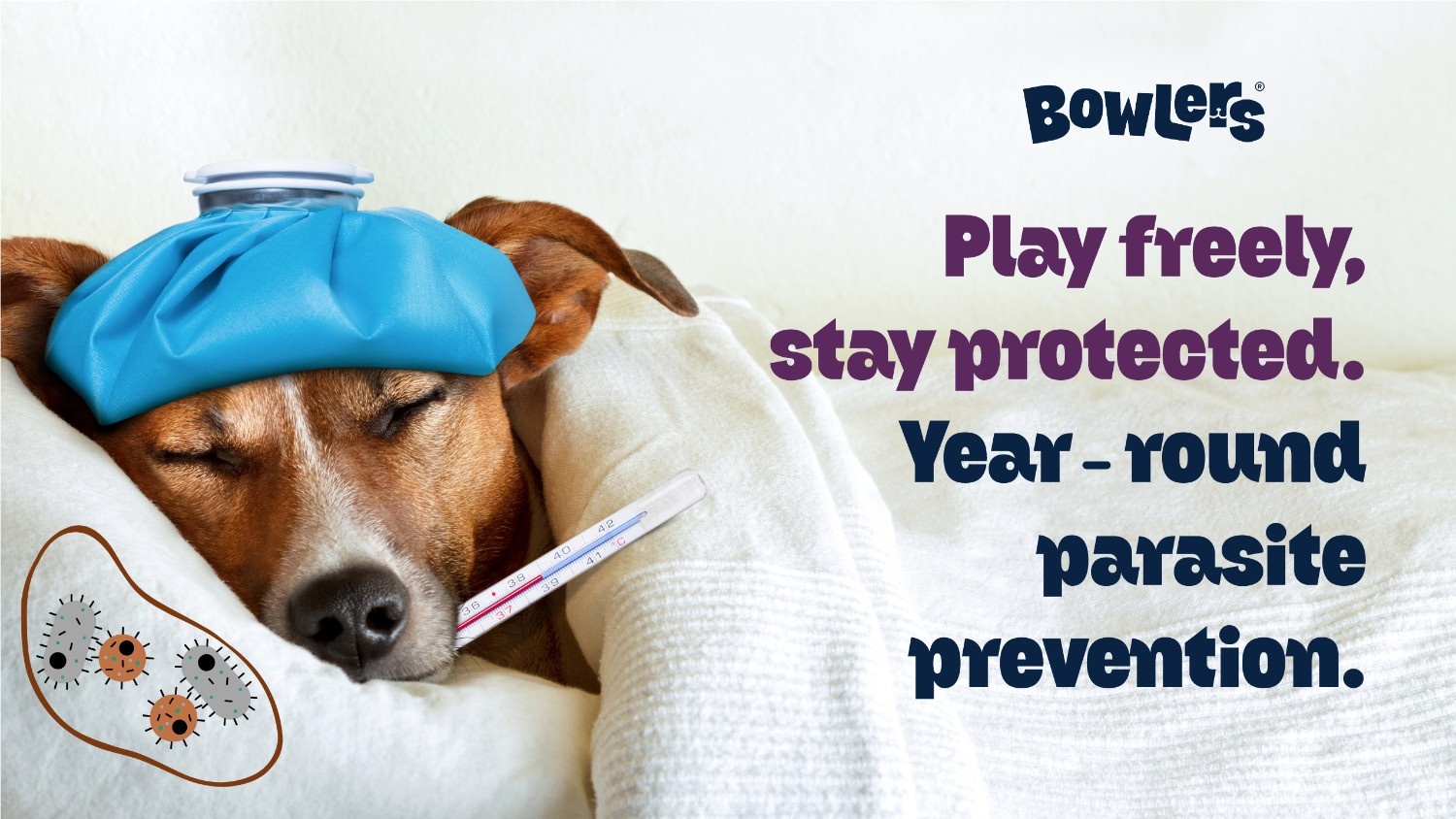Flea, Tick, and Worm Prevention: Protecting Your Dog Year Round

Table of contents
- Why Flea, Tick, and Worm Prevention Is Essential
- Flea Prevention Dogs: What You Need to Know
- Tick Treatment for Dogs: Protecting Against Serious Diseases
- Deworming Dogs: Fighting Intestinal Parasites
- Building a Year Round Parasite Prevention Routine
- How Exercise and Nutrition Support Parasite Prevention
- When to See the Vet
When it comes to preventive dog healthcare, protecting your furry friend from parasites is as important as providing a balanced diet and regular exercise. Parasites such as fleas, ticks, and worms are not only uncomfortable for your dog, they can also lead to serious health issues if left untreated. Fortunately, with the right approach and routine care, parasite prevention dogs are manageable and effective.
Here, we will walk you through the essentials of flea prevention dogs, tick treatment for dogs, and deworming dogs, along with the signs of infection and best practices to keep your dog healthy throughout the year. Whether your dog enjoys outdoor adventures or prefers lounging at home, year round parasite protection is key to ensuring a happy and disease free life.
At Bowlers, we believe that preventive care starts with awareness, education, and the right tools. Let’s explore how you can keep your dog safe from common parasitic diseases in dogs through a combination of treatments, hygiene, and routine health checks.
Why Flea, Tick, and Worm Prevention Is Essential
Parasites are more than just nuisances. They can cause itching, discomfort, and infections, and in severe cases, they may lead to life threatening diseases such as:
✔ Anemia from blood loss due to flea infestations
✔ Lyme disease or Rocky Mountain spotted fever from ticks
✔ Intestinal distress and malnutrition from worms like roundworms and hookworms
Effective prevention not only keeps your dog comfortable but also helps protect other pets and family members from exposure. Year round parasite control reduces the risk of spreading parasites through shared environments.
For early signs that your dog may be unwell, check out: 8 Signs of a Healthy Dog (and Early Warnings of Trouble).
Flea Prevention Dogs: What You Need to Know
Fleas are one of the most common parasites affecting dogs. They can survive in carpets, bedding, and outdoor spaces, making it easy for your dog to pick them up during walks or playtime.
Best Flea Control for Dogs
✔ Topical treatments – Applied monthly, these products kill adult fleas and prevent infestations.
✔ Oral medications – Provide long lasting protection by preventing flea larvae from developing into adults.
✔ Flea collars – Offer continuous protection but should be used in combination with other methods for severe infestations.
Tips for Effective Flea Prevention
✔ Bathe your dog regularly with flea safe shampoos.
✔ Wash your dog’s bedding and toys weekly.
✔ Treat your home and outdoor spaces if fleas are present.
Flea prevention is a year round effort, especially in warm or humid climates where flea populations thrive.
Tick Treatment for Dogs: Protecting Against Serious Diseases
Ticks attach themselves to your dog’s skin and feed on their blood, potentially transmitting serious diseases like Lyme disease and ehrlichiosis. Regular inspections and treatments are essential to prevent infections.
How to Check for Ticks
✔ Run your fingers through your dog’s fur, especially behind the ears, around the neck, and between the toes.
✔ Look for small dark spots embedded in the skin.
✔ Check after outdoor activities such as hiking or playing in grassy areas.
Effective Tick Treatment for Dogs
✔ Spot on treatments kill ticks before they transmit disease.
✔ Tick shampoos can remove ticks safely when discovered.
✔ Tick repellents protect against future infestations.
If you find a tick, use fine tipped tweezers to remove it carefully and consult your vet if you notice redness, swelling, or unusual behavior.
Learn more about scheduling routine health checks in: How Often Should You Take Your Dog to the Vet? A Complete Guide.
Deworming Dogs: Fighting Intestinal Parasites
Intestinal worms are often overlooked because their symptoms can be subtle at first. However, worms like roundworms, hookworms, whipworms, and tapeworms can cause severe digestive issues and nutritional deficiencies if untreated.
When and How to Deworm Dogs
✔ Puppies should be dewormed every 2–3 weeks until three months old.
✔ Adult dogs should receive deworming treatment at least every 3–6 months, depending on exposure risk.
✔ Use vet recommended oral medications to eliminate worms safely.
Signs That Your Dog Needs Deworming
✔ Weight loss despite a healthy appetite
✔ Vomiting or diarrhea
✔ Scooting or licking around the anus
✔ Dull coat or low energy levels
Regular stool checks and preventative deworming schedules are key components of your dog’s parasite protection plan.
Building a Year Round Parasite Prevention Routine
A consistent routine helps ensure that your dog stays protected from parasites at all times. Here’s a simple plan you can follow:
Daily
✔ Inspect your dog’s coat and paws for ticks and fleas
✔ Keep outdoor areas clean and free from standing water
Weekly
✔ Wash bedding, blankets, and toys
✔ Brush your dog’s coat to remove loose hair and check for parasites
Monthly
✔ Apply flea or tick treatments as recommended
✔ Administer deworming medication based on your vet’s advice
✔ Schedule a vet visit for routine wellness checks
A structured approach helps you stay proactive and prevents parasites from becoming a larger problem.
How Exercise and Nutrition Support Parasite Prevention
A well rounded approach to parasite prevention includes regular exercise and proper nutrition. Active dogs are more likely to explore outdoor environments where parasites hide, so it’s essential to balance their activity with safety measures.
✔ Regular exercise boosts your dog’s immune system, helping them fight infections.
✔ A balanced diet supports healthy skin and fur, making it harder for parasites to take hold.
✔ Supplements like omega-3 fatty acids can improve skin health, reducing itching and irritation.
For exercise guidelines tailored to your dog’s breed and age, check out: How Much Exercise Does Your Dog Really Need?.
When to See the Vet
If you notice any of the following symptoms, it’s time to schedule a vet visit:
✔ Excessive scratching, biting, or chewing
✔ Visible parasites in the fur or on the skin
✔ Sudden weight loss or diarrhea
✔ Unusual lethargy or changes in appetite
Your vet will assess the problem and recommend targeted treatments, parasite testing, or adjustments to your prevention plan.
Parasite prevention is an ongoing responsibility that plays a vital role in your dog’s health. By staying vigilant with flea prevention dogs, tick treatment for dogs, and deworming dogs, you’ll protect your pet from discomfort and dangerous diseases. Regular monitoring, proper treatments, and routine vet visits form the cornerstone of a healthy and parasite free lifestyle.
At Bowlers, we believe that proactive care, supported by the right knowledge and tools, empowers pet parents to create a safe and nurturing environment for their dogs. Along with a balanced diet and regular exercise, parasite prevention ensures that your dog stays happy, active, and free from disease.


